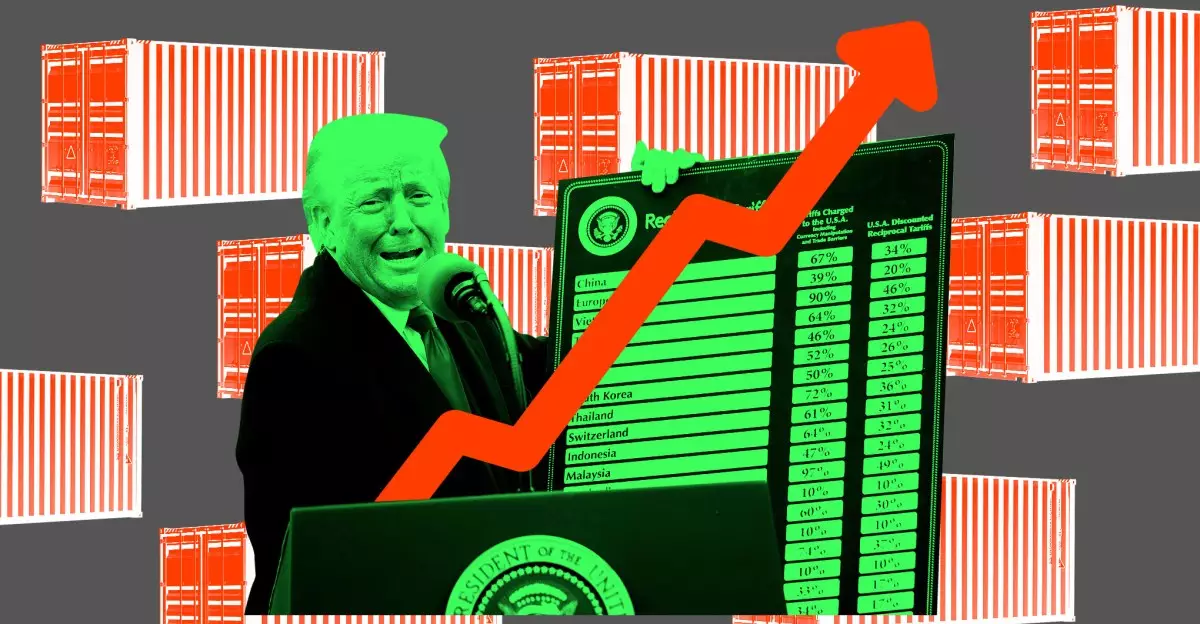The landscape of technology has never been static, but recent developments have thrust industry leaders like Meta, Apple, and Tesla into an unanticipated storm. The tumultuous intersection of corporate ambition and geopolitical rivalries has transformed these titans into pawns in a high-stakes game of trade and policy enforcement. The actions and rhetoric of the U.S. government have awakened a harsh reality: the tech industry, once viewed as an ally and driver of progress, now faces threats that could undermine its very foundation. This is a window into a disturbing future where regulations and tariffs exploit the immense influence held by these corporations against them, rather than allowing them to thrive.
Broken Promises: The Disillusionment of Tech Leaders
When President Donald Trump first took office, many in Silicon Valley saw an opportunity for a symbiotic relationship. Tech leaders, including the likes of Mark Zuckerberg, projected a future of collaboration that promised reduced regulations and the taming of the European Union’s increasingly stringent digital policies. The expectation was not merely hope; it was a calculation, a wager that the U.S. would champion Big Tech against the growing tide of regulation from abroad. Fast-forward to today’s aggressive trade tactics, and that optimism has morphed into a sense of betrayal. As proposals for levies on digital advertising revenues surface, the industry’s fear is palpable. Far from being allies, tech giants are increasingly perceived as collateral damage in an escalating diplomatic crisis.
TikTok’s Perilous Predicament
Among the corporate casualties, TikTok finds itself uniquely vulnerable. The app, enjoying widespread popularity in the U.S., is now scrutinized under an unforgiving microscope. Trump’s imposition of tariffs aimed at China has placed the platform in an unenviable position. Efforts to negotiate a future that would appease both the U.S. and its Chinese stakeholders seem to be stumbling before they even begin. As the Chinese government escalates its rhetoric against perceived economic injustices, TikTok’s executives, particularly those eager to sell, must navigate treacherous waters. In this sudden reversal of fortunes, the company’s ability to operate seamlessly hangs by a thread. What was once an engine of innovation is now a nexus of tension between two countries, leaving its employees grappling with an uncertain future.
Elon Musk and the Diminishing Luster of Tesla
Turning our gaze to Tesla, we witness yet another company grappling with the fallout from this geopolitical quagmire. Elon Musk’s outspoken support for Trump has seemingly backfired, leading to a reevaluation of public perception and trust. This shift is illustrated by the staggering fall in Tesla’s stock value, which has plummeted over a third of its overall worth within the year. The implications reach far beyond financial graphs; with the abolition of the option for American-made vehicles in China, Tesla loses not just revenue, but credibility on the international stage. This is a vital lesson for corporate leaders: political alliances can be fickle, and today’s support may swiftly become tomorrow’s liability.
AI Under Fire: OpenAI’s Ethical Dilemma
In the realm of artificial intelligence, OpenAI is navigating its own complicated landscape. The recent counter-suit against Elon Musk reflects a brewing resentment within the tech community over the organization’s sudden pivot from its non-profit foundations. This pivot raises ethical red flags about whether OpenAI has strayed too far from its mission to serve the public good. The rapid commercialization of AI technology has placed a spotlight on the dual-edged sword of influence—while it generates revenue, it also subjects organizations to public scrutiny. As the calls for accountability grow louder, OpenAI finds itself at a crossroads that threatens its legitimacy, potentially undoing the goodwill amassed over years of promising technological advancement.
The Ripple Effect: Google and Regional Discontent
Google, too, is feeling the pinch of external pressures. The layoffs in recent weeks have generated confusion and resentment among employees already weary from the stress of an unpredictable market landscape. While the company has long been a standard-bearer of corporate culture and worker protections, the restructuring signals a stark departure from that narrative. It begs the question: can corporations maintain their ethical obligations amidst the winds of change? If tech giants like Google begin to unravel the longstanding bonds of trust with their employees, the repercussions could resonate throughout the entire sector, affecting retention rates, innovation, and morale.
Power Shifts in the Technology Sector
As the tech industry undergoes seismic shifts, with corporations like Meta, Apple, and Tesla caught in a web of geopolitical maneuvering, the future looks uncertain. The powerful illusions of being above governmental squabbles are fading, as the industry realizes its own vulnerability. The growing integration of technology in global diplomacy exposes not just the fragilities of these corporations but also the very foundations of our digital future. Pioneers in tech must now recalibrate their strategies not just for market competition, but also to navigate the treacherous landscape of international relations—a balancing act that will define the next era of innovation and influence.

